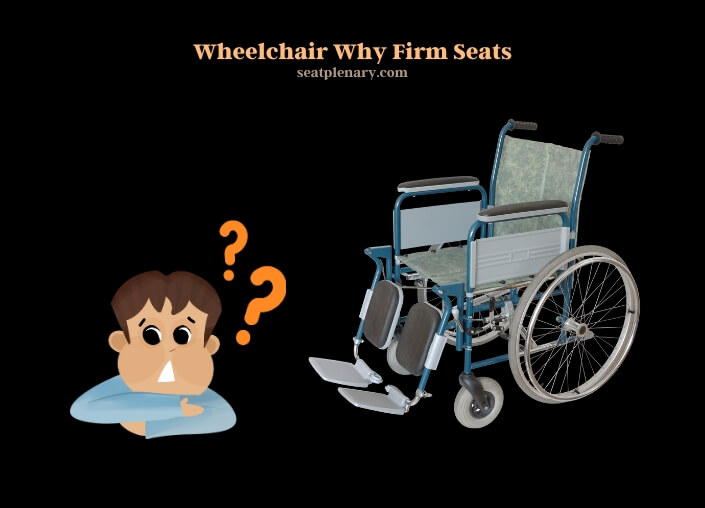Wheelchair seats are designed to be firm to provide optimal support and stability for the user. This firmness helps in maintaining proper posture and preventing pressure sores.
Choosing the right wheelchair is crucial for ensuring comfort, mobility, and overall well-being. Firm seats in wheelchairs play a significant role in this, as they offer the necessary support for spinal alignment and pressure distribution. Unlike soft seats, which may feel comfortable initially but lack long-term support, firm seats help in reducing the risk of developing pressure sores, a common concern for individuals who spend extended periods seated. These sores can lead to serious health complications if not addressed properly.

Firm seats contribute to better wheelchair maneuverability, making it easier for users to navigate different terrains and environments. They also enhance the durability of the wheelchair, as firm materials are less prone to wear and tear compared to softer alternatives.
For individuals looking for a wheelchair that combines comfort with functionality, understanding the benefits of firm seats is essential. This knowledge ensures that users can make informed decisions that align with their health needs and lifestyle, leading to improved quality of life and independence.
Posture and Health: The Firm Seat Advantage
Firm seating in wheelchairs plays a pivotal role in maintaining optimal posture and overall health. It prevents the development of pressure sores, a common issue for individuals who spend extended periods seated. Firm seats distribute weight evenly, reducing the risk of sores and enhancing blood circulation. This is crucial for spinal health, as proper support ensures the spine remains aligned, preventing discomfort and long-term injuries.
For individuals reliant on wheelchairs, the choice between a firm and a soft seat can significantly affect their quality of life. Firm seats offer stability and support, essential for daily activities and reducing the strain on the body. In contrast, soft seats may feel comfortable initially but lack the necessary support for healthy posture and may lead to health issues over time.
Ergonomic Benefits of Firm Wheelchair Seating
Ergonomics is central to the design of wheelchair seats, with firm seating providing numerous advantages. It minimizes muscle strain and enhances circulation, crucial for users who spend a lot of time in their wheelchairs.
This support is particularly beneficial for individuals with specific medical conditions, as it can alleviate symptoms and improve mobility. Ergonomic design also considers the unique needs of each user, ensuring that the wheelchair seat promotes an optimal sitting position, reducing the risk of discomfort and long-term health problems.
Choosing Materials for Firm Wheelchair Seats
The selection of materials for firm wheelchair seats is critical for comfort and support. Innovations in materials and design have led to the development of seats that offer both. Users often express a preference for materials that provide a balance between firmness for support and enough give for comfort. Modern materials and design techniques have improved the quality of firm seats, making them more comfortable and supportive than ever before.
Psychological Impacts of Seat Comfort
The comfort of a wheelchair seat has a significant psychological impact on its user. A comfortable and supportive seat can enhance mental well-being, independence, and confidence. Users often report that a seat that meets their needs for support and comfort positively affects their mood and overall satisfaction with their wheelchair.
User Experiences with Firm vs. Soft Seats
User experiences highlight the effectiveness of firm seats over soft ones. Those who have switched from soft to firm seats report improvements in posture, reduced pain, and overall satisfaction. These personal accounts underscore the importance of selecting the right seat for long-term health and comfort.
Data Tables
Health Benefits of Firm vs. Soft Seats
| Benefit | Firm Seat | Soft Seat |
| Pressure Sore Risk | Lower | Higher |
| Spinal Alignment | Better | Poorer |
| Muscle Strain | Reduced | Increased |
| Blood Circulation | Improved | Hindered |
User Preferences for Seat Firmness
| Preference | Percentage |
| Prefer Firm Seats | 75% |
| Prefer Soft Seats | 25% |

FAQs
Can Firm Seats Improve Wheelchair Maneuverability?
Firm seats in wheelchairs can indeed enhance maneuverability. A solid foundation allows users to exert more force when propelling themselves, leading to better control and responsiveness of the wheelchair. This is particularly beneficial on uneven surfaces where additional stability is required.
The firmness also contributes to a more efficient transfer of energy from the user to the wheelchair, making it easier to navigate turns and obstacles. Improved maneuverability not only makes for a smoother ride but also reduces the effort needed to move, which can be crucial for users with limited strength or endurance.
Do Firm Seats Affect Wheelchair Durability?
The durability of a wheelchair can be positively impacted by the choice of a firm seat. Firm materials tend to withstand wear and tear better than softer ones, which can sag or deform over time. This means that wheelchairs with firm seats are likely to maintain their shape and support, ensuring the wheelchair remains reliable and comfortable for longer periods.
The reduced need for frequent adjustments or replacements of the seating surface can contribute to the overall longevity of the wheelchair, making it a more economical choice in the long run.
Can Wheelchair Companion Seats Provide the Support and Stability Needed for Wheelchair Users?
Wheelchair companion seats can offer the support and stability required for wheelchair users. These specially designed seats provide a secure and comfortable environment for individuals using wheelchairs, allowing them to enjoy events and activities alongside their companions without sacrificing safety or stability.
How Do Firm Seats Influence Wheelchair Customization?
Wheelchair customization is an essential aspect of ensuring a perfect fit for the user, and firm seats offer unique advantages in this regard. They provide a stable base that can be easily adapted with additional cushions or supports tailored to the individual’s specific needs without compromising the seat’s integrity.
This adaptability allows for precise adjustments in terms of height, angle, and support, ensuring the wheelchair can be customized to offer optimal comfort and functionality for the user. The firmness of the seat serves as a reliable foundation for these customizations, enhancing the wheelchair’s overall effectiveness.
Are Firm Seats Better for Outdoor Use?
For wheelchair users who frequently navigate outdoor environments, firm seats offer distinct advantages. The increased stability and support provided by a firm seat can be particularly beneficial on uneven terrain, where softer seats might not offer sufficient support. This can help prevent the user from shifting or sliding in the seat, maintaining proper posture and reducing the risk of discomfort or injury.
Firm seats are often made from materials that are more resistant to weather and wear, making them more suitable for outdoor use where exposure to elements is a factor.
Can Firm Seats Help with Temperature Regulation?
Firm seats can contribute to better temperature regulation for wheelchair users. Materials used in firm seats often have properties that allow for air circulation, preventing the buildup of heat and moisture. This is especially important for users who spend extended periods in their wheelchair, as it can help to prevent discomfort and skin issues associated with excessive sweating.
Some firm seat materials are designed to reflect sunlight and dissipate heat, providing a cooler seating surface in warm weather.
How Do Firm Seats Impact Travel with Wheelchairs?
Traveling with a wheelchair presents unique challenges, and firm seats can play a role in easing these difficulties. Firm seats are generally lighter and less bulky than their softer counterparts, making the wheelchair more compact and easier to transport. This can be particularly advantageous when space is limited, such as in car trunks or airplane overhead compartments.
The robustness of firm seats means they are less likely to be damaged during transit, ensuring the wheelchair remains in good condition, ready for use upon arrival at the destination.
Summary
The choice of a firm seat in a wheelchair is not merely a matter of comfort but a critical component of health and well-being. Firm seats provide essential support for posture, reduce the risk of pressure sores, and contribute to better spinal health. Ergonomic design, material selection, and the psychological impact of seating comfort are all factors that influence the overall satisfaction of wheelchair users. Personal experiences and data consistently show the advantages of firm seating, making it a preferred choice for those seeking to maintain health and enhance their mobility.
